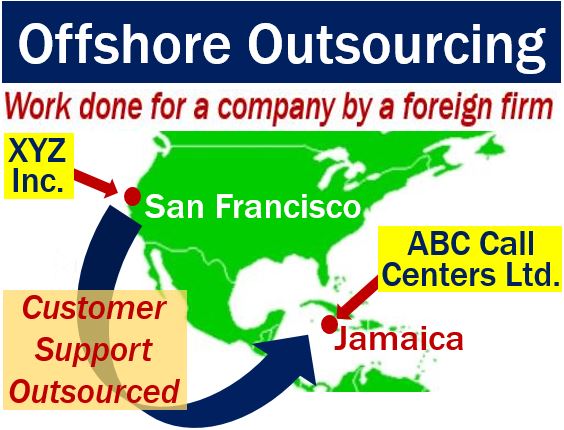Offshore outsourcing – definition and meaning
If you outsource one of your company’s business activities abroad, you are involved in Offshore Outsourcing. Perhaps you have done it because labor costs are lower, or the other country has cheaper raw materials.
Some businesses offshore outsource when there are not enough skilled workers in their home country. However, this is relatively rare. If you cannot find the right staff at home, you have 3 choices: 1. Bring them in from abroad. 2. Go abroad to them (offshore outsourcing). 3. Train some of your existing staff.
Techopedia has the following definition of the term when used in the world of IT (information technology) or IT-enabled processes and services: “Offshore outsourcing is the process of outsourcing IT or IT-enabled processes and services to a service provider in a different country. It is a form of the outsourcing process that uses a service provider that is not in the same country and often not on the same continent as the company paying for services.”
With offshore outsourcing, the company is not recruiting staff abroad. It is not taking on new employees. Instead, it is contracting an organization abroad to perform some of its business functions. In other words, it is ‘outsourcing’ abroad.
Outsourcing means farming out work to a third party supplier. The company does not do the work in-house.
The Challenges of Offshore Outsourcing
- Language, culture, time zones
While offshore outsourcing offers numerous advantages, such as cost savings and access to global talent, it also comes with its own set of challenges. Communication barriers can arise due to differences in language, culture, and time zones. This can lead to misunderstandings or delays in project completion.
- Keeping sensitive data secure
Data security is another concern. When sharing sensitive information with an offshore partner, there is a risk of data breaches or non-compliance with data protection laws.
Before signing a contract with a prospective partner, conduct thorough due diligence. In other words, check them out carefully. Find out whether they have robust data protection measures in place.
- Quality control
You have less control regarding the quality of work, i.e., you may find that the quality of their work is inconsistent. To overcome this potential problem, you must establish clear guidelines, offer training when necessary, and regularly review the quality of the work produced.
By addressing these challenges head-on, you are much more likely to succeed with your overseas business partner.
Offshore outsourcing vs. other offshore terms
In business, the word ‘offshore‘ usually means ‘in another country.’ Therefore, an offshore fund is a fund that exists overseas. Often, offshore funds operate in tax havens. Tax havens are places with either zero or very low tax rates.
The term ‘offshore outsourcing’ contrasts with ‘offshoring.’ In offshoring, the firm relocates part of its business to another country.
An offshore company is one that operates in one country but is registered abroad.
Offshore manufacturing means that the company moves its production facility abroad. Ford Motor Company, for example, has factories in Mexico which export cars to the United States.
If I have an offshore account, it means that my account is in another country.

Offshore outsourcing and the Internet
Since the emergence of the Internet, people, and small businesses have increased the use of freelancers. In fact, even large corporations use many freelancers today.
Employers can use freelancers from across the world to complete projects. With telework, i.e., working remotely, there are two advantages for the employer:
– It is easier to find the best prices. In other words, costs are low. Freelance workers in India, for example, earn significantly less per hour than their American, Canadian, or British counterparts.
– If you can select people globally, you are more likely to find workers with the right skills.
Crowdsourcing systems such as CrowdFlower and Mechanical Turk have increased the element of scalability exponentially. Today, employers can outsource information tasks online to millions of workers internationally.
Thanks to the Internet, small businesses can now enjoy the economies of scale of large corporations. In other words, they can take advantage of offshore outsourcing to compete more effectively with large companies.
Video – What is Offshore Outsourcing?
Offshore outsourcing – opposition
Many companies praise the benefits of relocating business activities abroad. However, a growing number of people worry about the effects on their domestic economy.
The most common criticism is that competition from workers abroad damage the domestic job market. Also, salaries remain low at home if employers can take advantage of cheap labor abroad.
American trade unions say that offshore outsourcing has led to the closure of domestic factories. They say that thousands of US jobs have disappeared.
However, the United States has one of the lowest unemployment rates in the developed world.
Offshore outsourcing opponents, however, say that the US unemployment rate is misleading. They point out that most of the new jobs are badly paid and not secure positions.
The gig economy has increased dramatically in the US, UK, and other European Union nations. In the gig economy, employers hire freelancers and part-timers. All work contracts are for short periods. Put simply; in a gig economy, there are no permanent jobs.
Since the 2007/8 global financial crisis, most developed nations have shifted towards gig economies. Salaries in the US have barely managed to keep up with inflation since the 2007/8 financial crisis. In fact, in the UK, wages have not kept up.
According to Task Us, offshore outsourcing is a strategic practice in which “a business hires a third party supplier to perform work in a nation other than the one in which the hiring business primarily conducts its operations.”

